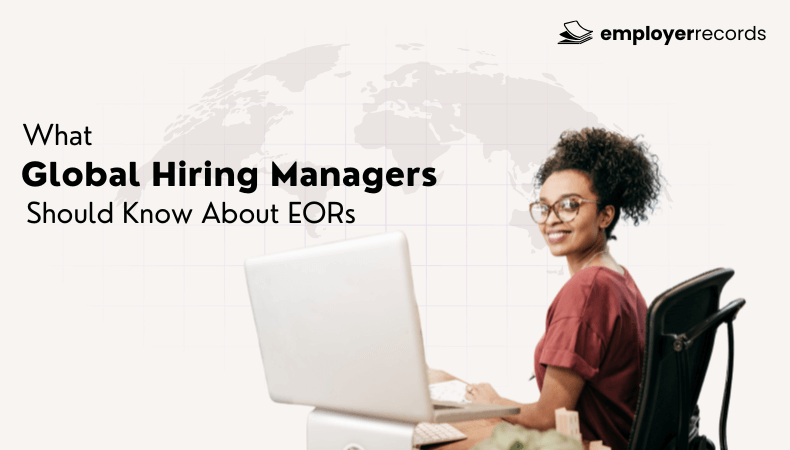Hiring across borders has never been more accessible, or more legally complex. With the rise of remote work and global teams, many companies are eager to tap into international talent without setting up costly local entities. And at first glance, skipping an Employer of Record (EOR) might seem like a smart way to save time and money.
But here’s the catch: what feels like agility on the surface can quickly spiral into fines, tax audits, and even lawsuits if you’re not compliant with local employment laws.
From worker misclassification to unexpected payroll liabilities and permanent establishment risks, hiring internationally without an EOR can quietly open the door to serious legal trouble.
In this article, we’ll break down the hidden legal risks of hiring without an EOR and explain why partnering with one is often the safer, more scalable route for growing global teams.
Key Takeaways
- Hiring without an EOR can lead to misclassification and legal penalties.
- Tax and labor law violations are common without local expertise.
- Contractor missteps can trigger audits, fines, and lawsuits.
- EORs handle payroll, compliance, and legal risks on your behalf.
- An EOR simplifies global hiring and protects against liability.
What Is An EOR?
An Employer of Record (EOR) is a third‑party organization that legally employs workers on behalf of another company, assuming all statutory responsibilities to ensure proper compliance with local labor regulations.
By handling payroll, the EOR ensures timely disbursements and accurate tax withholding and remittance per local requirements. They manage benefits like healthcare, retirement plans, and paid leave to satisfy local mandates.
The EOR drafts and maintains contracts, updating them as laws change to reduce compliance risks. This arrangement lets companies focus on operations without forming local entities for each market.
Common Scenarios Where Companies Skip An EOR
Companies often employ quick‑fix strategies to avoid using an EOR, but these shortcuts can expose them to significant legal and financial risks when operating internationally. Below are common tactics and their pitfalls:
- Hiring independent contractors overseas: Companies classify remote workers as contractors to dodge employment regulations, yet misclassification risks back taxes, penalties, and benefit liabilities if tax authorities or courts reclassify them as employees.
- Expanding into new markets without setting up a legal entity: Entering a country without a local subsidiary may save initial costs, but firms face hurdles around tax registrations, labor compliance, and potential fines for operating unlawfully.
- Relying on freelance platforms or short‑term project agreements: Freelance marketplaces simplify hiring, yet they often lack robust legal protections, leaving firms vulnerable to IP disputes, inconsistent contract terms, and regulatory scrutiny.
- Using “consulting” labels to bypass employment regulations: Labeling workers as “consultants” can mask true employment relationships, but this tactic invites co‑employment disputes and severe misclassification penalties when authorities uncover the arrangement.
While these approaches may offer short‑term flexibility, they create major legal gaps that can undermine long‑term operational stability and growth.
Key Legal Risks Of Hiring Without An EOR
Hiring international employees without an Employer of Record (EOR) may seem straightforward, but it exposes companies to significant legal and financial risks. Without proper legal infrastructure in place, businesses can inadvertently violate local employment laws, leading to costly consequences.
| Legal Risk | Description |
|---|---|
| Worker Misclassification | Mislabeling employees as contractors may lead to lawsuits, back taxes, and penalties. |
| Non-Compliance with Labor Laws | Missing jurisdiction-specific rules on termination, benefits, or wages invites fines. |
| Payroll Tax Violations | Inaccurate tax withholding or late filings can trigger audits and penalties. |
| Permanent Establishment Risk | Local authorities may consider your activity taxable, leading to unexpected corporate taxes. |
| Invalid Employment Contracts | Using non-local or English-only contracts can void protections and trigger disputes. |
Worker Misclassification
Mislabeling full-time employees as “contractors” can trigger costly lawsuits, back‑tax assessments, and penalties when authorities determine workers should have been classified as employees.
Misclassified workers may file claims for unpaid wages, overtime, and benefits, often escalating into class‑action suits that amplify both financial and reputational damage.
Non‑Compliance With Labor Laws
Without local expertise, companies frequently overlook mandatory benefits, termination procedures, and minimum‑wage statutes unique to each jurisdiction.
Such gaps can lead to fines, forced retroactive payments, and legal disputes when regional regulators audit employment practices.
Payroll Tax Violations
Handling multi‑jurisdictional tax withholding and filings incorrectly exposes employers to audits, interest, and penalties.
Governments are increasingly vigilant; failure to remit social security contributions, income tax withholdings, or other statutory levies can result in significant financial liability and enforcement actions.
Permanent Establishment (PE) Risk
Employing remote staff without an EOR may inadvertently create a taxable “permanent establishment” in a foreign country.
Authorities can deem business activities, such as contract negotiations or decision‑making, sufficient to establish PE status, leading to corporate tax obligations and complex compliance requirements.
Lack of Legal Contracts
Using generic or English‑only agreements can render employment contracts unenforceable under local law.
Inadequate or missing local‑language documentation increases exposure to litigation, prevents efficient dispute resolution, and hampers the enforcement of non‑compete or confidentiality clauses.
“Hiring without an EOR might save you money now, but the cost of misclassification, payroll mistakes, or local labor law violations can be 10x higher later.”
EOR vs. Direct Hiring: Risk Comparison
When expanding globally, businesses must decide between hiring talent directly or through an Employer of Record (EOR). Each approach carries distinct risks and responsibilities, especially in areas like legal compliance, payroll, and employee management.
| Category | Hiring Without EOR | Hiring With EOR |
| Worker Classification | Risk of misclassification | Fully compliant classifications |
| Tax Compliance | Company handles (often poorly) | EOR manages all tax filings |
| Labor Law Knowledge | Often limited | Local experts ensure compliance |
| Termination Process | Risk of wrongful termination | Handled per local legal standards |
| Administrative Burden | High | Low |
Industries Most Vulnerable To Compliance Issues
Remote work compliance poses significant risks for various sectors that rapidly scale or rely heavily on distributed talent.
Companies in these industries can face legal penalties, operational disruptions, and reputational damage if they overlook critical jurisdictional, tax, data, and labor regulations in their rush to expand globally.
- Tech & SaaS: Rapid scaling of SaaS platforms often outpaces the development of robust compliance frameworks, leaving companies vulnerable to data privacy and regulatory oversights as they expand globally.
- Consulting & Agencies: Agencies relying on international contractors must navigate a “mountain of complexities,” including local employment laws, tax liabilities, and contractor misclassification risks in each jurisdiction.
- Startups: Early-stage startups typically lack dedicated legal teams and structured compliance processes, increasing the likelihood of inadvertently breaching regional labor and tax regulations when hiring remote staff abroad.
- E-commerce: E‑commerce businesses that engage remote customer support and developer teams across borders face complex statutory requirements for benefits, data protection, and permanent establishment risk which can disrupt operations if not properly managed.
How An EOR Mitigates Legal Exposure
By partnering with an EOR, businesses transfer critical employment‑law risks, such as misclassification, noncompliance with local labor codes, benefits shortfalls, payroll errors, and invalid contracts, to a specialist provider. This legal “shield” not only helps avoid fines and lawsuits but also preserves corporate reputation and enables confident global expansion.
This legal “shield” not only helps avoid fines and lawsuits but also preserves corporate reputation and enables confident global expansion.
Proper Classification of Employees
An EOR ensures that each worker is correctly classified, employee vs. contractor, under local law, preventing costly misclassification penalties.
Misclassifying staff can trigger back‑tax assessments, fines, and legal fees; by contrast, EORs leverage in‑country expertise to apply the correct status from day one. This protects your business from audits and retroactive liabilities, since the EOR assumes responsibility for any classification disputes.
Adherence to Country‑Specific Labor Codes
Every jurisdiction has unique rules governing working hours, termination procedures, notice periods, and statutory entitlements.
An EOR keeps abreast of these local labor codes, drafting compliant contracts and enforcing mandatory policies, to ensure your remote employees always work within legal boundaries. This proactive approach prevents violations that could lead to fines or government‑mandated shutdowns.
Correct Benefits and Leave Entitlements
Local laws mandate minimum benefits, healthcare, retirement contributions, paid leave, parental leave, and more, which vary widely across countries. EORs design benefits packages that meet or exceed these requirements, managing contributions and entitlements on your behalf.
By handling statutory leave calculations and benefit administration, they eliminate the risk of underprovisioning or benefit‑related disputes.
On‑Time Tax and Payroll Filings
Timely and accurate payroll processing, tax withholding, and statutory filings are critical to avoid interest, penalties, or criminal charges. EORs maintain robust payroll systems and local tax expertise, ensuring all deposits and returns are submitted by the required deadlines.
Because the EOR is the legal employer, it bears liability for any payroll or tax errors, shielding your company from direct exposure.
Legally Enforceable Contracts in the Worker’s Language
Employment contracts must comply with local formalities, specific clauses, mandatory language, and translations to be enforceable. EORs draft and execute contracts in the employee’s native language, embedding all required legal provisions.
It’s not just about avoiding fines, it’s about reducing liability and preserving your company’s global reputation.
Conclusion
Hiring without an Employer of Record (EOR) may seem agile, but it carries significant legal exposure, including employee misclassification risks and associated penalties.
Misclassifying workers as contractors rather than employees can trigger back taxes, fines, and obligations to retroactively provide benefits. Without a local entity, companies also face permanent establishment risks, potentially incurring corporate tax liabilities in foreign jurisdictions.
Potential lawsuits arise when contractors assert employee status, leading to costly litigation and reputational harm. Tax authorities in multiple countries may audit and impose fines for non‑compliant payroll and withholding practices.
Partnering with an EOR transforms compliance from a liability into a strategic investment, enabling safe, scalable international growth.







